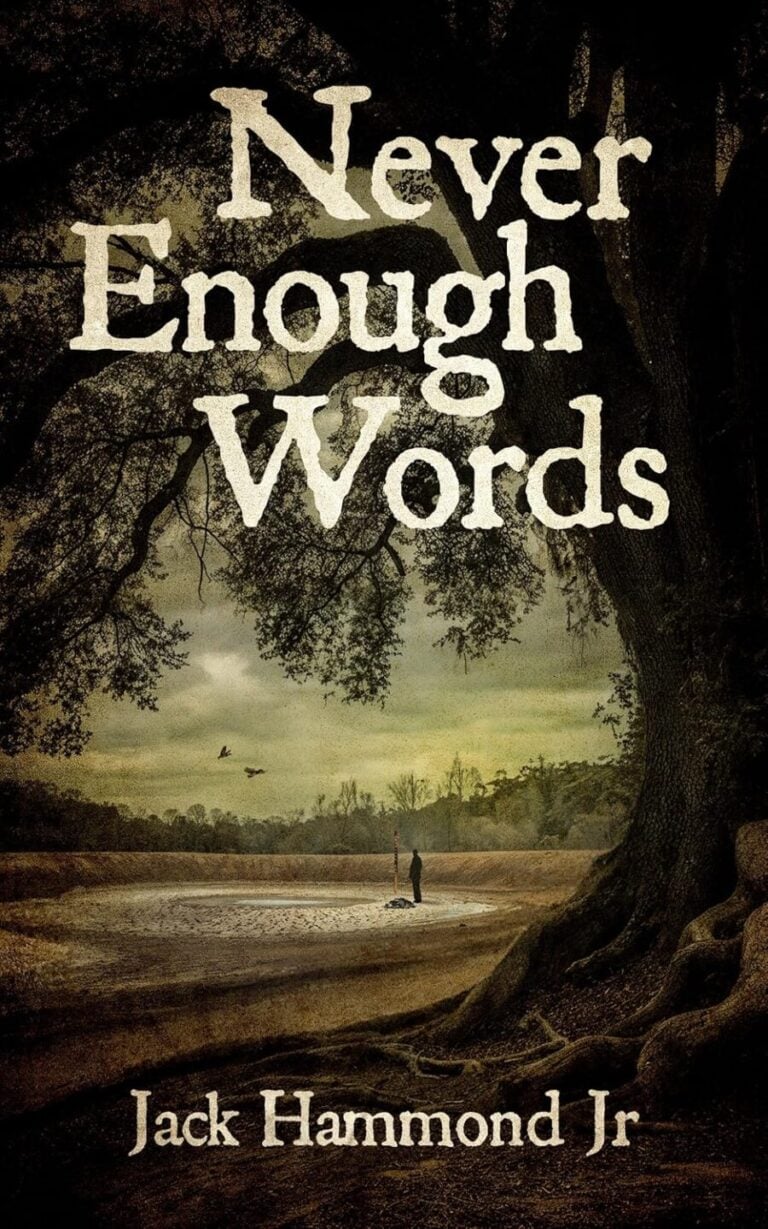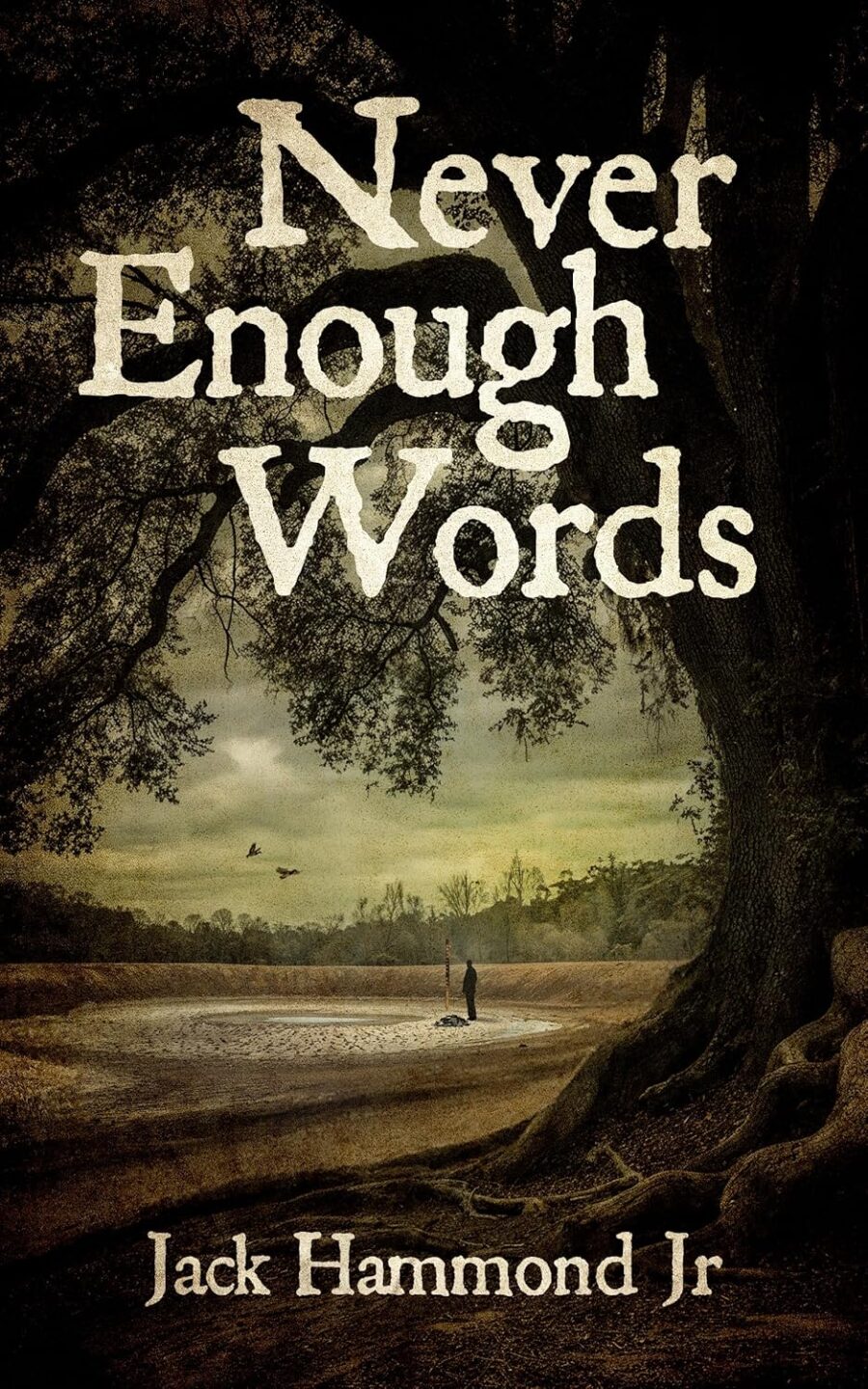Scots Bend, South Carolina is one of those slow-moving towns that returns to familiar cycles over long stretches of time. There is always a generation of men remembering their war—the Civil War, the World Wars, Korea, etc. There is always a tense, asymmetric relationship between the white residents and the black ones—the latter often shunted to the outskirts of town—and the Calder family has always tried to be respectful and level-headed. Even 10-year-old Joe, who struggles to understand a world in which nuclear war could destroy humanity, presidents are assassinated, and simmering racial tensions are explosively broadcast on national television.
Jack Hammond Jr.’s NEVER ENOUGH WORDS looks at a pivotal moment in American history: the 1960s, when the passage of the Civil Rights Act began to legally dismantle the apparatus of the Jim Crow South. In its treatment of such a broad and sensitive topic, this novel manages to keep tight control of its material with intense specificity, grounding the action in a small Southern town with a limited number of characters. The text does an excellent job of “grounding” in particular; living in a culture of hunters, fishers, and trappers, the characters are keenly attuned to the natural world around them. Objects like the Big Oak, which has been used as a waypoint for time immemorial, build the sense that the natural world is an eternal, unchanging, mute witness to the violent upheavals of human life. Yet the narrative opens with the town reservoir emptied by a natural disaster, a shocking change to the physical fabric of Scots Bend. This interplay between what has always been and what is rapidly changing generates the primary interest of the text.
Tales of the American South often indulge a certain lyricism, including in their structural choices, and NEVER ENOUGH WORDS is no exception. Scots Bend is drawn with looping, backward-looking sentences aware of their own history: “What the townspeople still call the new courthouse, though it was nearly a hundred years old, rises off the foundation of the older one burned by Sherman’s troops in the spring of 1865.” The characters are also powerfully encapsulated in scenic, often moving descriptive episodes: the reader learns more than enough about 10-year-old Joe when the text notes that once, when “they found a new hatch of tadpoles in a small landlocked pool that the Judge said would dry up before the next rain, [Joe] stubbornly hauled water to them every day until the tadpoles’ metamorphosis into tiny bullfrogs.” These more verbose descriptions make room for crisper, shorter turns of phrase that can pack a physical or emotional punch. The day does not simply dawn: “Morning [comes] slowly, forcing the night away.” In a key thematic moment, one character offers forgiveness, but cautions, “that doesn’t mean what’s done is undone.” These powerful descriptive maneuvers, and the images they evoke, will stick deep in any reader. There are a few missing or misplaced quotation marks, and missing commas in one or two places, but not enough to detract from the overall impression of control and clear intent.
NEVER ENOUGH WORDS touches on ideas and feelings that have remained near the heart of American identity. The intense hatred of the Jim Crow world is hard to escape, and as the text notes, “hatred patiently waits for a spark to ignite it into a firestorm.” Yet the story never quite proposes a solution, or reckons with what it means to live with this moral sword of Damocles forever hanging over the nation’s head. There is a moving and resonant climax to the central narrative, but its promise feels unfulfilled; the ending elides a great deal of story left to tell.
Nevertheless, NEVER ENOUGH WORDS is a beautiful memorial to the personal, everyday struggles and sacrifices of decent people trying to change what has always seemed eternal.
Jack Hammond Jr.’s NEVER ENOUGH WORDS is a beautifully told and harrowing tale of the confrontation between humanity and hate.
~Dan Accardi for IndieReader


